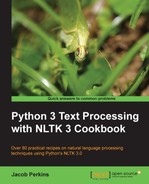- Python 3 Text Processing with NLTK 3 Cookbook
- Table of Contents
- Python 3 Text Processing with NLTK 3 Cookbook
- Credits
- About the Author
- About the Reviewers
- www.PacktPub.com
- Preface
- 1. Tokenizing Text and WordNet Basics
- Introduction
- Tokenizing text into sentences
- Tokenizing sentences into words
- Tokenizing sentences using regular expressions
- Training a sentence tokenizer
- Filtering stopwords in a tokenized sentence
- Looking up Synsets for a word in WordNet
- Looking up lemmas and synonyms in WordNet
- Calculating WordNet Synset similarity
- Discovering word collocations
- 2. Replacing and Correcting Words
- 3. Creating Custom Corpora
- Introduction
- Setting up a custom corpus
- Creating a wordlist corpus
- Creating a part-of-speech tagged word corpus
- Creating a chunked phrase corpus
- Creating a categorized text corpus
- Creating a categorized chunk corpus reader
- Lazy corpus loading
- Creating a custom corpus view
- Creating a MongoDB-backed corpus reader
- Corpus editing with file locking
- 4. Part-of-speech Tagging
- Introduction
- Default tagging
- Training a unigram part-of-speech tagger
- Combining taggers with backoff tagging
- Training and combining ngram taggers
- Creating a model of likely word tags
- Tagging with regular expressions
- Affix tagging
- Training a Brill tagger
- Training the TnT tagger
- Using WordNet for tagging
- Tagging proper names
- Classifier-based tagging
- Training a tagger with NLTK-Trainer
- 5. Extracting Chunks
- Introduction
- Chunking and chinking with regular expressions
- Merging and splitting chunks with regular expressions
- Expanding and removing chunks with regular expressions
- Partial parsing with regular expressions
- Training a tagger-based chunker
- Classification-based chunking
- Extracting named entities
- Extracting proper noun chunks
- Extracting location chunks
- Training a named entity chunker
- Training a chunker with NLTK-Trainer
- 6. Transforming Chunks and Trees
- Introduction
- Filtering insignificant words from a sentence
- Correcting verb forms
- Swapping verb phrases
- Swapping noun cardinals
- Swapping infinitive phrases
- Singularizing plural nouns
- Chaining chunk transformations
- Converting a chunk tree to text
- Flattening a deep tree
- Creating a shallow tree
- Converting tree labels
- 7. Text Classification
- Introduction
- Bag of words feature extraction
- Training a Naive Bayes classifier
- Training a decision tree classifier
- Training a maximum entropy classifier
- Training scikit-learn classifiers
- Measuring precision and recall of a classifier
- Calculating high information words
- Combining classifiers with voting
- Classifying with multiple binary classifiers
- Training a classifier with NLTK-Trainer
- 8. Distributed Processing and Handling Large Datasets
- Introduction
- Distributed tagging with execnet
- Distributed chunking with execnet
- Parallel list processing with execnet
- Storing a frequency distribution in Redis
- Storing a conditional frequency distribution in Redis
- Storing an ordered dictionary in Redis
- Distributed word scoring with Redis and execnet
- 9. Parsing Specific Data Types
- A. Penn Treebank Part-of-speech Tags
- Index
In a chunk, a cardinal word, tagged as CD, refers to a number, such as 10. These cardinals often occur before or after a noun. For normalization purposes, it can be useful to always put the cardinal before the noun.
The swap_noun_cardinal() function is defined in transforms.py. It swaps any cardinal that occurs immediately after a noun with the noun so that the cardinal occurs immediately before the noun. It uses a helper function, tag_equals(), which is similar to tag_startswith(), but in this case, the function it returns does an equality comparison with the given tag:
def tag_equals(tag):
def f(wt):
return wt[1] == tag
return fNow we can define swap_noun_cardinal():
def swap_noun_cardinal(chunk):
cdidx = first_chunk_index(chunk, tag_equals('CD'))
# cdidx must be > 0 and there must be a noun immediately before it
if not cdidx or not chunk[cdidx-1][1].startswith('NN'):
return chunk
noun, nntag = chunk[cdidx-1]
chunk[cdidx-1] = chunk[cdidx]
chunk[cdidx] = noun, nntag
return chunkLet's try it on a date, such as Dec 10, and another common phrase, the top 10.
>>> swap_noun_cardinal([('Dec.', 'NNP'), ('10', 'CD')])
[('10', 'CD'), ('Dec.', 'NNP')]
>>> swap_noun_cardinal([('the', 'DT'), ('top', 'NN'), ('10', 'CD')])
[('the', 'DT'), ('10', 'CD'), ('top', 'NN')]The result is that the numbers are now in front of the noun, creating 10 Dec and the 10 top.
-
No Comment
